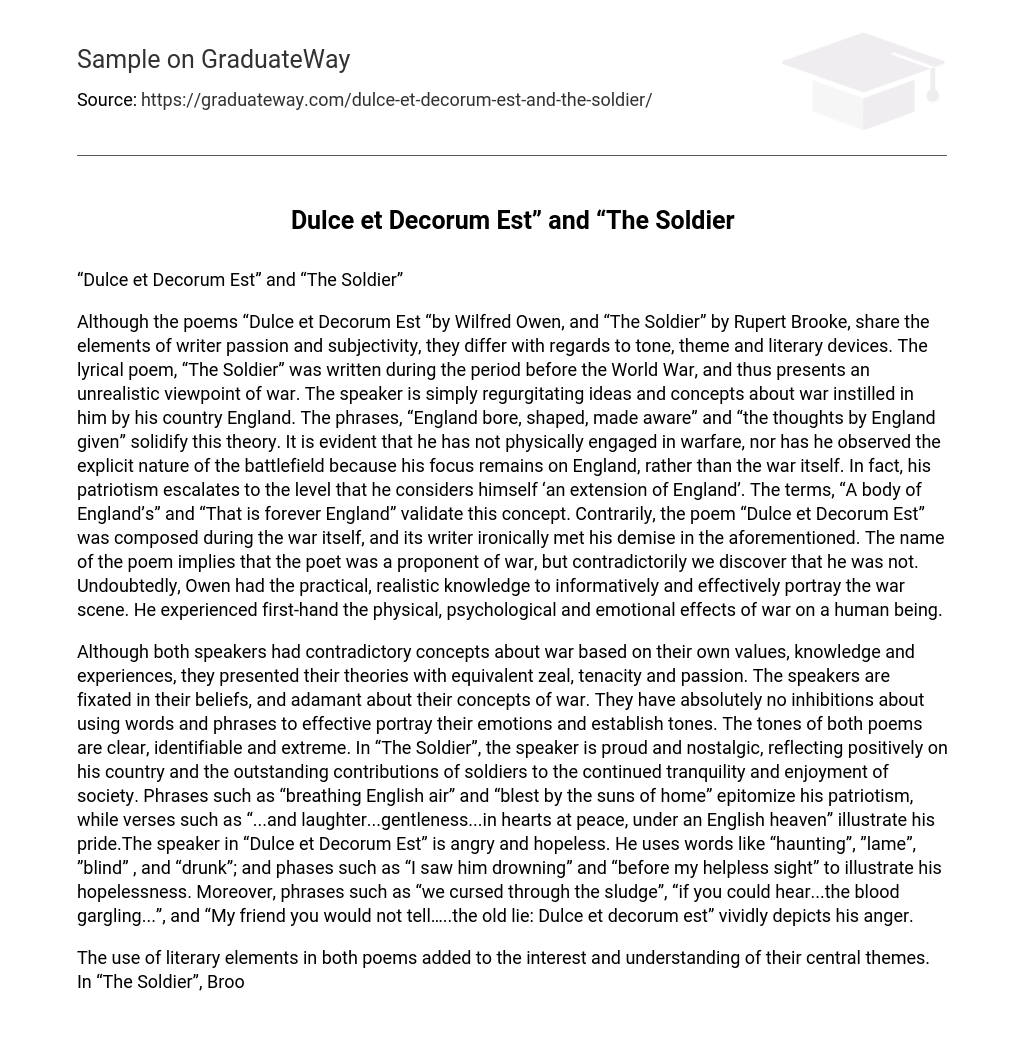Although the poems “Dulce et Decorum Est “by Wilfred Owen, and “The Soldier” by Rupert Brooke, share the elements of writer passion and subjectivity, they differ with regards to tone, theme and literary devices. The lyrical poem, “The Soldier” was written during the period before the World War, and thus presents an unrealistic viewpoint of war. The speaker is simply regurgitating ideas and concepts about war instilled in him by his country England. The phrases, “England bore, shaped, made aware” and “the thoughts by England given” solidify this theory. It is evident that he has not physically engaged in warfare, nor has he observed the explicit nature of the battlefield because his focus remains on England, rather than the war itself. In fact, his patriotism escalates to the level that he considers himself ‘an extension of England’. The terms, “A body of England’s” and “That is forever England” validate this concept. Contrarily, the poem “Dulce et Decorum Est” was composed during the war itself, and its writer ironically met his demise in the aforementioned. The name of the poem implies that the poet was a proponent of war, but contradictorily we discover that he was not. Undoubtedly, Owen had the practical, realistic knowledge to informatively and effectively portray the war scene. He experienced first-hand the physical, psychological and emotional effects of war on a human being.
Although both speakers had contradictory concepts about war based on their own values, knowledge and experiences, they presented their theories with equivalent zeal, tenacity and passion. The speakers are fixated in their beliefs, and adamant about their concepts of war. They have absolutely no inhibitions about using words and phrases to effective portray their emotions and establish tones. The tones of both poems are clear, identifiable and extreme. In “The Soldier”, the speaker is proud and nostalgic, reflecting positively on his country and the outstanding contributions of soldiers to the continued tranquility and enjoyment of society. Phrases such as “breathing English air” and “blest by the suns of home” epitomize his patriotism, while verses such as “…and laughter…gentleness…in hearts at peace, under an English heaven” illustrate his pride.The speaker in “Dulce et Decorum Est” is angry and hopeless. He uses words like “haunting”, ”lame”, ”blind” , and “drunk”; and phases such as “I saw him drowning” and “before my helpless sight” to illustrate his hopelessness. Moreover, phrases such as “we cursed through the sludge”, “if you could hear…the blood gargling…”, and “My friend you would not tell…..the old lie: Dulce et decorum est” vividly depicts his anger.
The use of literary elements in both poems added to the interest and understanding of their central themes. In “The Soldier”, Brooke made extensive use of personification to demonstrate the relationship between his country and himself. He refers to England as a woman, a gender synonymous with softness, warmth and love. He uses phrases such as “…her flowers to love, her ways to roam” and “Her sights and sounds; dreams happy as her day” to portray femininity. The poem “Dulce et Decorum Est” uses imagery and similes to reinforce its theme, and make the war scene realistic for the audience. Phrases such as “hunting flares”, “misty panes”, “thick green light” make the setting vivid; while “smothering dreams”, “white eyes writhing”, “froth-corrupted lungs”, “guttering, choking, and drowning” and “vile, incurable sores” ignite a level of graphic discomfort. Moreover, Owens’s use of similes such as “like old beggars”, “coughing like hags” and “like a devil’s sick of sin” solidify the imagery. The themes of both poems, though contradictory, are passionate and clear. Brooke, in “The Soldier”, believes that it is honorable to die for one’s country, and that war is necessary for the maintenance of peace and happiness in a country. He wants his legacy to reflect his service as a soldier more than any other accolades that he may have attained. He establishes this point at the beginning of the poem with the words “If I should die, think only this of me”. Contrarily, the poem “Dulce et Decorum Est” portrays the horror of war, and the naivety and ‘luring ‘of most young, innocent recruits to the battlefield. The poet believes that there is no glory in dying for one’s country, and individuals are unaware of the hardships and tragedy of war. The last four verses of the poem is illustrative of this. “My friend, you would not tell with such high zest
To children ardent for some desperate glory,
The old lie: Dulce et Decorum est
Pro patria mori”.
The poets of “The Soldier” and “Dulce et Decorum Est” cohesively utilize literary elements to effectively portray their concepts of war. The use of the aforementioned elements contributed to the overall understanding, clarity and interest of the poems.





